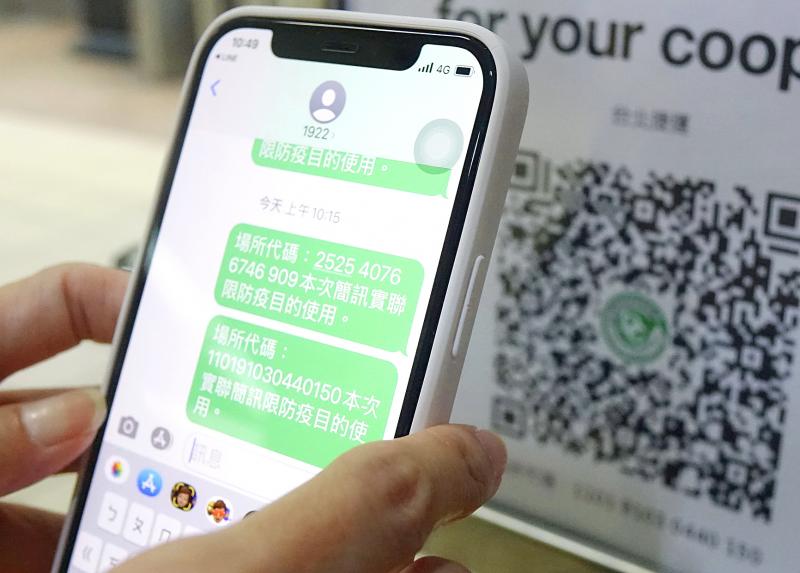Scammers have developed new strategies to extract personal information and money amid the COVID-19 outbreak in Taiwan, the Taichung Police Department said on Sunday.
The department provided advice to avoid online scams amid a surge in reports of people posing as contact tracing officials or e-commerce platforms.
Scammers have developed new strategies to extract information and money, it said.

Photo: Chien Jung-fong, Taipei Times
Some pose as contact tracing officials, messaging targets to tell them that they have been listed as a contact of a confirmed case, it said.
They ask for the target’s birthdate, national identification number, family members and other information, the department said.
Contact tracing personnel do not ask for ID numbers or bank accounts, police said, adding that if in doubt, people should ask the person to identify themselves.
To avoid inadvertently spreading misinformation, people can follow the Centers for Disease Control Line account to receive the latest COVID-19-related news or call 1922 to ask about reports, the department said.
Special Act for Prevention, Relief and Revitalization Measures for Severe Pneumonia with Novel Pathogens (嚴重特殊傳染性肺炎防治及紓困振興特別條例) stipulates that individuals who spread rumors or disinformation about COVID-19 that risk harming the public interest can face a maximum prison term of three years and a possible fine of NT$3 million (US$108,292).
Scammers are also looking to take advantage of the increase in online shopping under a level 3 COVID-19 alert, the department said.
They often create simple one-page advertisements for popular products using images of celebrity “spokespeople” and directly message people to circumvent e-commerce platform rules, it said.
Such scams often have prices far below market norms and do not provide contact information, it said.
People should only use credible stores and avoid private transactions, it said.
Online transactions indirectly increase the risk of personal spending records being leaked, the department said.
Scammers can use these records to claim that a product has been mistakenly refunded or payments have been canceled to trick people into sending them money, it said.
People who receive such calls should hang up immediately and dial the 165 hotline, it added.
The National Police Agency urged people to check the recipient details of automatically generated real-name registration text messages amid reports that people have tampered with QR codes.
Scammers have been swapping government QR codes in front of stores with ones that, instead of sending a text message to 1922, send one to a number with an expensive toll, it said.

TRAFFIC SAFETY RULES: A positive result in a drug test would result in a two-year license suspension for the driver and vehicle, and a fine of up to NT$180,000 The Ministry of Transportation and Communications is to authorize police to conduct roadside saliva tests by the end of the year to deter people from driving while under the influence of narcotics, it said yesterday. The ministry last month unveiled a draft of amended regulations governing traffic safety rules and penalties, which included provisions empowering police to conduct mandatory saliva tests on drivers. While currently rules authorize police to use oral fluid testing kits for signs of drug use, they do not establish penalties for noncompliance or operating procedures for officers to follow, the ministry said. The proposed changes to the regulations require

The Executive Yuan yesterday announced that registration for a one-time universal NT$10,000 cash handout to help people in Taiwan survive US tariffs and inflation would start on Nov. 5, with payouts available as early as Nov. 12. Who is eligible for the handout? Registered Taiwanese nationals are eligible, including those born in Taiwan before April 30 next year with a birth certificate. Non-registered nationals with residence permits, foreign permanent residents and foreign spouses of Taiwanese citizens with residence permits also qualify for the handouts. For people who meet the eligibility requirements, but passed away between yesterday and April 30 next year, surviving family members

Taiwanese officials are courting podcasters and influencers aligned with US President Donald Trump as they grow more worried the US leader could undermine Taiwanese interests in talks with China, people familiar with the matter said. Trump has said Taiwan would likely be on the agenda when he is expected to meet Chinese President Xi Jinping (習近平) next week in a bid to resolve persistent trade tensions. China has asked the White House to officially declare it “opposes” Taiwanese independence, Bloomberg reported last month, a concession that would mark a major diplomatic win for Beijing. President William Lai (賴清德) and his top officials

The German city of Hamburg on Oct. 14 named a bridge “Kaohsiung-Brucke” after the Taiwanese city of Kaohsiung. The footbridge, formerly known as F566, is to the east of the Speicherstadt, the world’s largest warehouse district, and connects the Dar-es-Salaam-Platz to the Brooktorpromenade near the Port of Hamburg on the Elbe River. Timo Fischer, a Free Democratic Party member of the Hamburg-Mitte District Assembly, in May last year proposed the name change with support from members of the Social Democratic Party and the Christian Democratic Union. Kaohsiung and Hamburg in 1999 inked a sister city agreement, but despite more than a quarter-century of